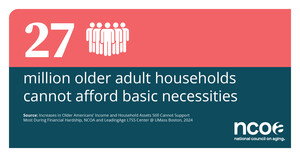Older Adults Most Vulnerable to Influenza and Related Complications; Vaccination Options for Adults 65 and Older Available this Season
- The National Council on Aging (NCOA) is leading the charge to educate older adults about the threat of influenza and the importance of immunization through a new awareness initiative called Flu + You.
- Each year in the United States about nine out of 10 flu-related deaths and more than six out of 10 flu-related hospital stays occur in people over the age of 65.
- With the first baby boomers turning 65 and the population aging in general, it is more critical than ever to understand how aging affects the body's ability to fight infection and the simple steps that can be taken to help protect against influenza – one of the most deadly and costly diseases for older adults.
WASHINGTON, June 19, 2012 /PRNewswire-USNewswire/ -- The National Council on Aging announced today it is spearheading a new initiative to help protect older adults from influenza this upcoming flu season. The educational program, Flu + You, in collaboration with Sanofi Pasteur, aims to educate older adults and their caregivers about the seriousness of influenza, the importance of annual influenza immunization, and available vaccine options.
(Logo: http://photos.prnewswire.com/prnh/20100615/NCOALOGO)
"The Centers for Disease Control and Prevention (CDC) has long recommended that older adults receive an annual influenza immunization as the best way to help prevent the flu, yet immunization rates are still far below public health goals," said Richard Birkel, PhD, MPA, acting senior vice president of Healthy Aging and director of NCOA's Self-Management Alliance. "Too many older adults fail to self-identify in the high-risk group for influenza or defer immunization thinking others need the shot more than they do."
Older adults, particularly those over the age of 65, are urged not to wait and to get their annual flu shot as soon as it is available each year. The body's immune system and its ability to fight illness decrease with age, which means that older adults are more vulnerable to influenza and its related complications. In fact, each year in the United States about nine out of 10 flu-related deaths and more than six out of 10 flu-related hospital stays occur in people over the age of 65.
Unfortunately, as we age, the likelihood of developing other chronic medical conditions, such as heart disease, COPD, and diabetes, also increases, and having one or more underlying chronic conditions further increases the risk of influenza-related deaths in older patients. Nationwide, 91 percent of adults 65 years of age and older have at least one chronic condition and 76 percent have two or more chronic conditions.
The age-related decline in the immune system also affects the body's response to vaccination. Recent studies have shown that the traditional flu vaccine might not work as well for people 65 years of age and older. As the immune system weakens, fewer antibodies are produced following vaccination to help protect the body against infection. Antibodies are the soldiers of the immune system helping to respond and protect against infection when exposed to the virus.
The flu vaccine still offers the best defense to protect against influenza. Adults aged 65 and older have two vaccine options available – the traditional flu shot, as well as a widely available higher dose flu vaccine designed specifically for this population to address the age-related decline of the immune system. The higher dose flu shot triggers the body to produce more antibodies against the flu virus than would be produced by the traditional flu shot.
Both the traditional and higher dose flu shot options are among the vaccines recommended by the CDC for adults 65 years of age and older. Medicare Part B covers all influenza vaccine options recommended for this age group with no copay, including the higher dose option.
"Too often, the particular health needs of older Americans are overlooked," said Dr. Birkel. "As a national voice for older Americans and the community organizations that serve them, the Flu + You initiative seeks to improve influenza immunization rates among older Americans who are most vulnerable to influenza and its complications. Our objective for Flu + You is to help older Americans understand why their age makes influenza a serious health threat and to empower them and their caregivers with information about vaccination and the immunization options available to them."
Flu + You
NCOA, with the support of Sanofi Pasteur, has developed educational materials designed to reach older adults, caregivers, and health care providers with critical information regarding influenza and immunization options.
NCOA will conduct extended regional programming for the Flu + You campaign in the states of Arizona, Florida, and Pennsylvania to reach older adults and their caregivers.
For more information regarding regional training and on Flu + You, visit www.ncoa.org/Flu.
About NCOA
The National Council on Aging is a nonprofit service and advocacy organization headquartered in Washington, DC. NCOA is a national voice for millions of older adults—especially those who are vulnerable and disadvantaged—and the community organizations that serve them. It brings together nonprofit organizations, businesses, and government to develop creative solutions that improve the lives of all older adults. NCOA works with thousands of organizations across the country to help seniors find jobs and benefits, improve their health, live independently, and remain active in their communities. For more information, please visit: www.NCOA.org | www.facebook.com/NCOAging | www.twitter.com/NCOAging
SOURCE National Council on Aging
WANT YOUR COMPANY'S NEWS FEATURED ON PRNEWSWIRE.COM?
Newsrooms &
Influencers
Digital Media
Outlets
Journalists
Opted In






Share this article